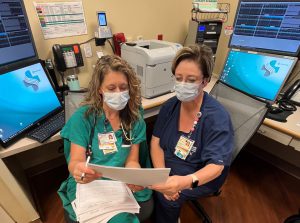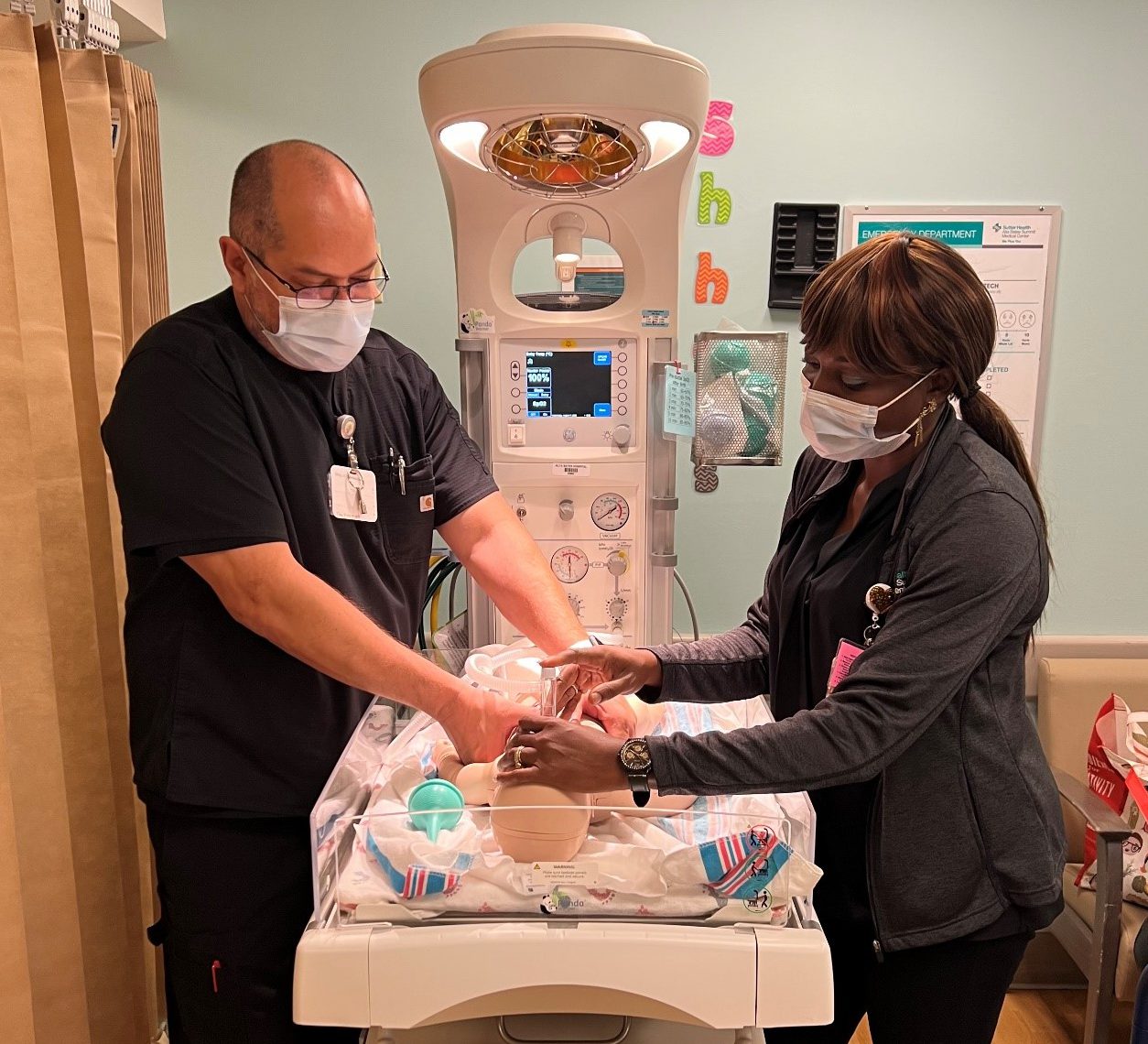By Bryan Gardner and Monique Binkley Smith, Vitals contributors
Kristi Gabel and Blossom Inuenwi are part of an elite group at a Northern California healthcare system. Out of more than 50,000 employees at Sutter Health, only about 30 are clinical nurse specialists. At Sutter, clinical nurse specialists work to improve healthcare delivery by leading and facilitating change, coordinating specialized care, and developing and implementing evidence-based bedside care to achieve the best possible patient outcomes.
“One of the reasons we’re a healthcare system of choice is that we strongly encourage our nurses to pursue advanced certifications. Clinical nurse specialists are great examples of what specialized training can bring to our organization. They mean so much to our staff and patients, and it’s important we show them gratitude during National Clinical Nurse Specialist Recognition Week (Sept. 1 – 7), and every day,” says Anna Kiger, Sutter Health’s chief nurse officer.
Journey to a Dream Job
Gabel and Inuenwi each took a leap of faith to earn advanced nursing degrees. Each woman also struggled a bit to find a place to put her education to best use, and then landed their dream job as a clinical nurse specialist at Sutter.
Neither Gabel nor Inuenwi aimed to become a clinical nurse specialist at first.

Sutter Roseville Medical Center Clinical Nurse Specialist Kristi Gabel
Gabel, a perinatal CNS at Sutter Roseville Medical Center, dreamed of being a brain surgeon as a child. But the thought of 10 years in college and post-graduate school gave her pause. Then her neighbor, a surgical nurse, inspired Gabel to stay in healthcare –but take a shorter education route and study to become a registered nurse.
Meanwhile, her sister had a 4-H grand champion goat and Gabel found herself delivering baby goats on the family’s Bakersfield farm. “I had the smallest hands in the family, so I’d go in to help get the babies out,” she recalls.
Put those experiences together and it seems Gabel was destined for labor and delivery work. While doing her rotation in labor and delivery in nursing school, she says she knew she’d found her spot.
Inuenwi, a CNS in the emergency departments at Alta Bates Summit Medical Center’s Oakland and Berkeley campuses, originally wanted to be a pharmacist. But her aunt, a registered nurse, nudged her toward a career in nursing.

Blossom Inuenwi is a Clinical Nurse Specialist at Alta Bates Summit Medical Center
“I told her I’d give it a try and I’ve never looked back,” Inuenwi says. “The thing about being a nurse is the role really becomes you. Once you put on those scrubs, it’s like you never take them off.”
Change Agents for Patient Care and Quality
Gabel and Inuenwi each made the difficult decision to leave bedside patient care, but they say their careers are fulfilling because they enjoy having a positive impact on many more patients through teaching and supporting other nurses and healthcare professionals as they learn to use new tools, technologies, and processes.
According to the National Association of Clinical Nurse Specialists, clinical nurse specialists are advanced practice registered nurses who are expert clinicians in a specialized area of nursing practice. A clinical nurse specialist’s specialty may be defined by population (such as pediatrics or women’s health), setting (like critical care or emergency room), disease or medical subspecialty (such as diabetes or oncology), type of care (like psychiatric or rehabilitation), or type of problem (such as pain or wounds).
“The beauty of the CNS role,” Gabel says, “is that it can go in many directions, and you can wear different hats. You can be a change agent, an educator or a consultant.”
Gabel, for example, participated in California’s Pregnancy-Associated Mortality Review (CA-PAMR) committee, which used a state grant to scrutinize information about maternal deaths and develop evidence-based toolkits to help manage pregnancy complications. Through these toolkits, the committee helped dramatically reduce maternal deaths in California.
“We gave a voice and meaning to women who lost their lives,” Gabel says.

Training bedside nurses -with the goal of improving patient outcomes- is one role of a CNS.
Today, Gabel continues to share her knowledge as the CNS for postpartum, labor and delivery, nursery and pediatrics at Sutter Roseville.
“While I don’t [provide] direct patient care, I directly impact nurses who are at the bedside through education, new employee orientation and maintaining policy and procedures that are evidence-based,” says Gabel.
Inuenwi, originally from Nigeria, remembers when she first earned her CNS degree in 2013. “I couldn’t get a job as a CNS. They wanted experience in specialized care.”
So, she went out and got that experience, working five years as an emergency department nurse in another health system before coming to Sutter’s Alta Bates Summit Medical Center in 2021.
“I’ve gained a lot of knowledge over the years, and I can take the time to impart clinical education to nurses, especially new nurses,” Inuenwi says.
In the emergency department anything can happen and Inuenwi enjoys preparing nurses for those critical moments. “That’s the type of thing I’m most proud of,” she says.
She also enjoys the variety in her role. “I take part in a lot of committees and projects, and we do what’s necessary to improve our patient outcomes,” she says. “I believe I’m doing what I am supposed to do. This is my calling.”





